- Balatro is a mix of deckbuilder, card-battler and roguelike
- Take on rising bids as you work to build the highest-scoring hand
- Collect eclectic Jokers with varying effects to hit the high scores
Balatro, Balatro, Balatro! If you haven’t heard the name yet, please send me the number of whichever rock you’re living under. While flavour-of-the-month indies are pretty typical, a select few manage to carve out their own little niche to sit comfortably in, sometimes by force. This is the case with today’s subject, the Joker-heavy take on Solitaire, Poker and I’m sure any number of different card games.
From developer LocalThunk and publisher PlayStack, Balatro is the latest indie to break containment and take the world by storm. And it seems that it’s shaping up to be one of those lucky few that latches on and doesn’t let go, whether that’s with its recent mobile release or numerous collaborations with a variety of series; from Cyberpunk 2077 to Slay the Spire.
You may have guessed, but I was looking forward to Balatro’s mobile release. Since working at Pocket Gamer, I’ve been trying my best to live my truth (or however the saying goes) and actively play more mobile games. And Balatro seemed to be the perfect way to while away the hours, but like Vampire Survivors it may soon end up in regular rotation on my PC as well!
But enough of the preamble. You’re either here to find out if Balatro is right for you, or to just see what score I’ve given it. Either way, it’s time to dig into this surreal deckbuilding roguelike, so read on and let’s deal!
Disclaimer: I am not very good at Balatro, hence all my screenshots being of low scores and the Red deck.

Gameplay
Balatro is simple, until it isn’t. You have to form hands of playing cards that are then scored and multiplied to reach a certain bid. At first, you only need to focus on getting a good hand, but as the ante increases you’ll need to score higher and higher, far past where it’s mathematically possible with your base deck and cards. Fail, and your run finishes, then it’s right back to square one.
Of course, there are alternative cards with different effects. A lucky card (represented as a tattered, hand-drawn piece of paper) may net you $20 for the store, while a glass card provides an increase in your multiplier, albeit with a chance of shattering. But even these might not be enough. Fortunately, Balatro knows this.
That’s where Balatro’s signature mechanic comes in, the Joker. Not typically used in many card games, Jokers in Balatro are instead collectibles of their own. These range from giving you a randomised multiplier to multiplying your multiplyer depending on other variables that you can mess with – you even unlock more as you hit more milestones through successful and failed runs.Building up a competitive hand can lead to you not just meeting, but exceeding your required score. They come in different variations, sometimes activating only under specific circumstances, and more, all adding an enthralling spin to a typical card game.
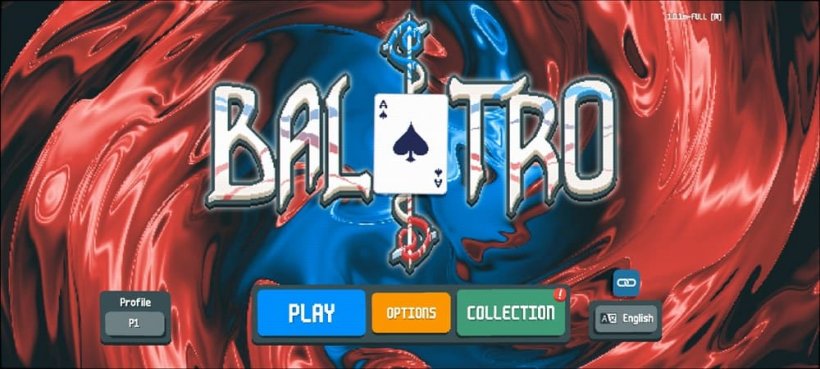
As you progress, while your ante increases you’ll also have the chance to hop into the store. “Money” you win can only be spent there, on new Jokers, booster packs or other specific cards that expire after each run. You then move on to each different blind, starting with small, moving onto big and then a “Boss Blind” with some mechanics that may require you only to play one type of hand, debuff certain cards or just provide a ridiculous score to match.
There’s even more mechanics-wise to cover that might make this review far too long. Whether that’s using Tarot cards to change suits, Planet cards to enhance the score of a given hand, or even Spectral cards with destructive yet powerful abilities. If you’re not a fan of traditional card games, you’d have to be a fool (pun intended) to not give Balatro a chance.
Those tarot cards I mentioned, and their rare, spectral cousins, can be used to mess with your deck, changing suits, ranks and adding bonuses to set cards, or even just plain ol’ destroying them.
Graphics
While you don’t usually think of graphics being important in a card game, rather than the usual method of adding flashy particle effects and explosions, Balatro instead utilises some pleasingly crunchy pixel graphics. The hypnotic background pattern effects and punchy use of colours are all very pleasing to the eye, and despite the smaller screen it’s still easy to tell cards apart, with perhaps the exception of the Club and Spades deck due to the former using a very dark green that can be mistaken for black at a glance.
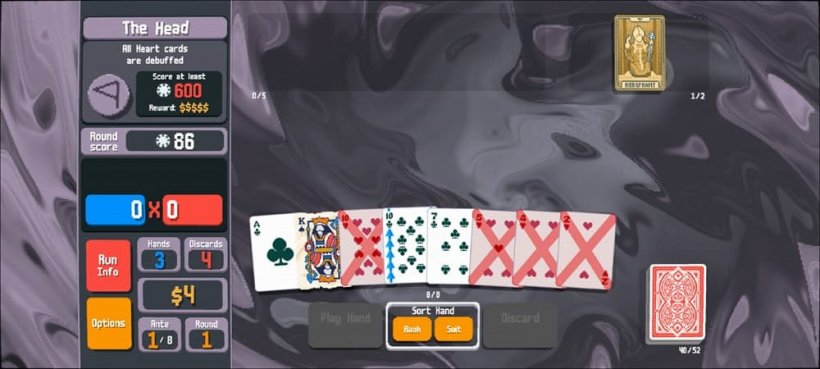
The Jokers are where the fun is of course, with designs for each that often have their own little in-jokes or puns. Regular playing cards can also have special versions such as polychrome, foil, glass or gold that all stand out great from the normal deck. The regular use of more subtle effects like cards ‘burning’ away when you use them is also quite pleasing. So while Balatro isn’t exactly an RTX-ready, Unreal Engine display showcase, it looks very good, with plenty of its own effects that stand out from the crowd.
Audio
Soundwise, Balatro doesn’t do much, but what it does do is very good indeed. The pleasing sound of shuffling cards, the ‘ding’ as you rack up multipliers and even the slow, calming music all work very well in immersing you and focusing your attention on the cards.
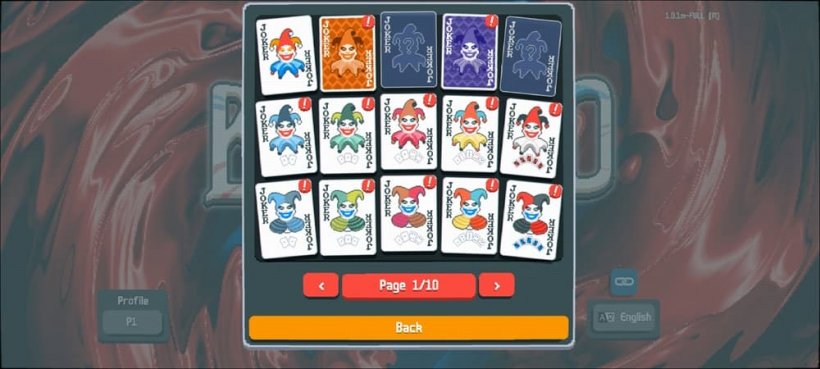
The music in particular is a standout which, while repetitive, is still oddly soothing. If I had to describe it, it’d be some sort of surreal mix between elevator muzak and lounge music, which doesn’t sound as if it’d be pleasing to the ear, but really is.
Performance
As far as performance goes, Balatro worked perfectly well for me. Given it’s a technically undemanding card game I’d be worried if it didn’t. In my case, it did have some issues with heating up my phone, but never to the point of it being a worry. And as we’ve established in previous reviews my S20 is probably getting on a bit anyway.
Balatro also offers both offline and online play, and while it does warn you if it can’t load your cloud save I never seemed to have an issue with lost progress. Options are somewhat slim but you can disable effects like screen shake or CRT lines, adjust your volume and even lower some of the graphical fidelity if you need to eke out an extra bit of performance for whatever reason.
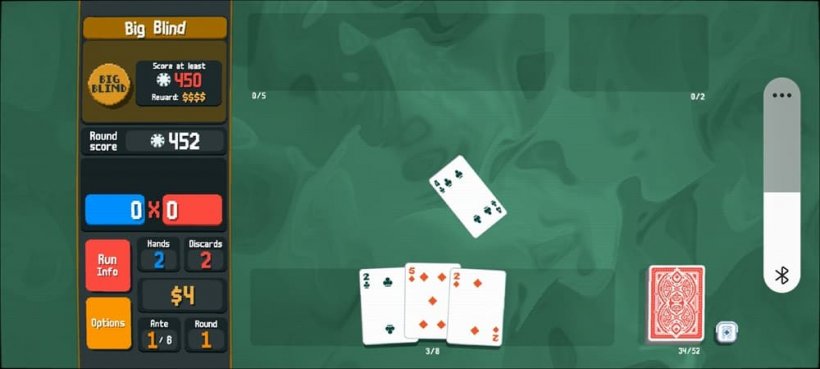
I found Balatro to be a great way to spend my time. The roguelike element means that each run is different, so you won’t end up attached to a particular hand or style of play, as you’ll have to adapt to the cards that are dealt to you. This means that there’s always a fresh challenge, but nothing can quite reach the same level of satisfaction as when you get a particularly great series of Jokers that boost your multipliers into the stratosphere.
It’s also one of those games that hit the rather rare niche of being one I don’t mind people peering over my shoulder at. While it may be easy to scoff at someone playing Genshin Impact or Clash of Clans, if you want to look like a bit of an intellectual to random subway passengers, this Solitaire-like is sure to wow them as they look on at this obviously mature individual.
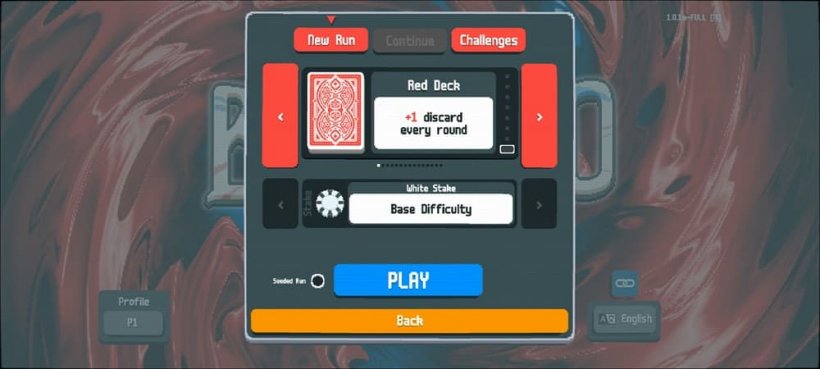
Balatro is difficult to master, especially if you’re not a player of traditional card games, as I am. Admittedly it isn’t really about “winning” in a regular sense, since the slow creep upward in antes and the correspondingly ridiculous scores you need to achieve are basically aimed at you slowly increasing your high score each time and unlocking more Jokers. So really, by the time you finish any of the decks Balatro probably already has its hooks firmly in you.
I do wish it had some more in the way of tutorials for “advanced” play. Understanding how to prioritise Jokers, Tarot, Planet or Spectral cards would help me feel a bit more in control of how I’m doing. Although given that there’s always the element of chance I can understand why this might be a Fool’s errand (pun also intended).
Who would want this? (New!)
Now it’s time for me to refocus myself with this additional section for my reviews! Essentially, I’m answering the simple question of “Is this right for me?” by telling you why I think you should buy a game, and who this is good for. Think of it as a tl;dr for those who don’t want to dissect my views and nuances.
Put simply, if you’re not against spending $9.99 for hours of gameplay in a genuinely enthralling, visually pleasing and surprisingly deep card game that’ll keep you coming back for more, then this is the game for you. Balatro has enormous depth and simple rules, but with enough additional mechanics that even 48 hours in you’ll still feel as if you’re only scraping the surface.
It’s suitable for both card-game newbies and avid players alike and if you need a way to quickly learn some basic poker hands this is also a great resource.
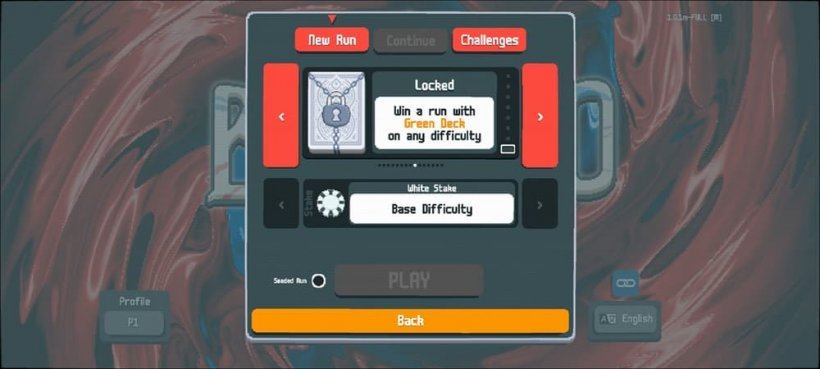
If you’ve been hesitant to buy Balatro, don’t be. This eclectic mix of deckbuilder, roguelike and card-battler, with a healthy lashing of surreal sound and visuals, is well worth the relatively minuscule fee to have it in the palm of your hand wherever you go. While other mobile card games may demand constant adherence to the meta, and wrestling with the tryhardiest of tryhards, in Balatro it’s just you and Jimbo(?).
